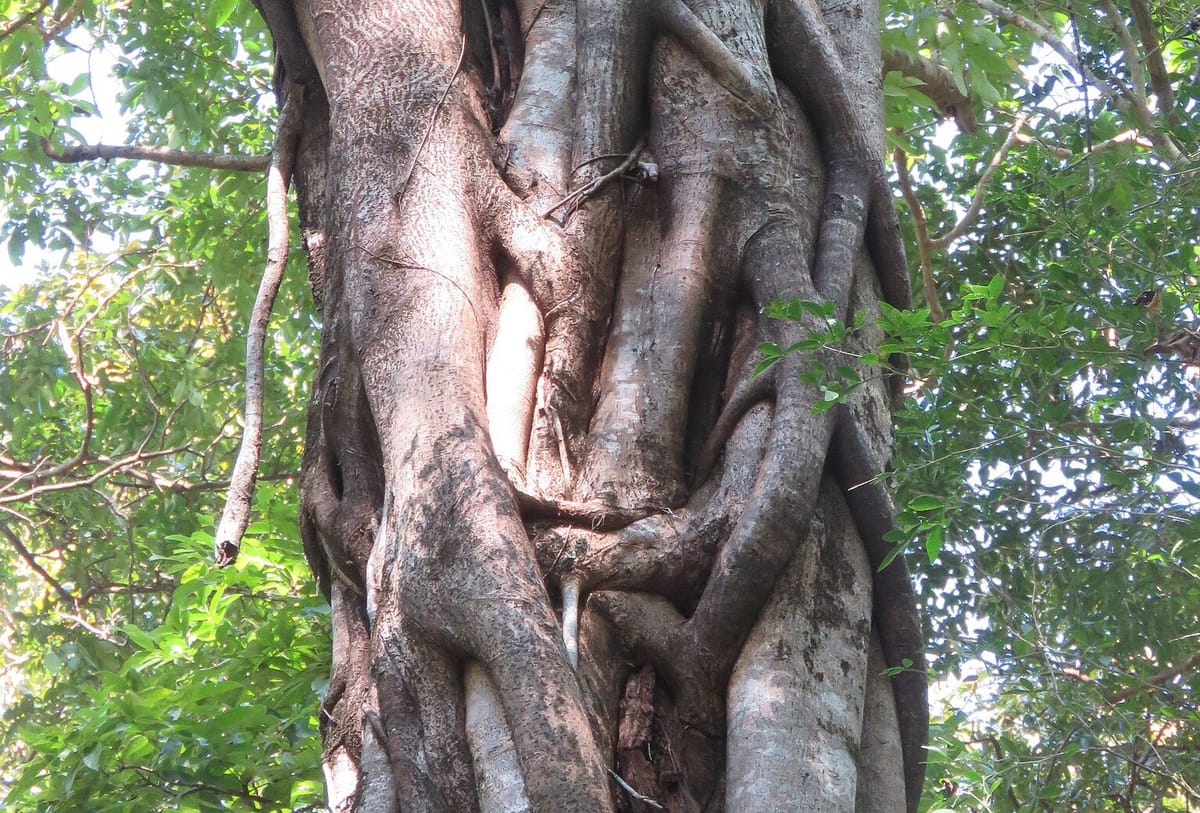Content warnings
Medical trauma. Ableism. Bullying. Discrimination.
I was born with a tree branch on one side instead of an arm. The doctor diagnosed it as a kind of parasitic infection previously known only in plants; I was the first ever human carrier of a plant-parasitic disease. The branch was a strangler fig that grew smoothly out of my shoulder, starting as little more than a twig and growing as I did. The roots were too entwined around my organs to be removed; doctors couldn't even guess at my life expectancy but at 30 it's safe to say I've exceeded every estimate.
As a child I couldn't go out in the cold, or the ache in my shoulder where the roots touched bone would be unbearable. No matter how much wrapping-up my mother lovingly did, a few minutes out in the freezing northern winter would have me in tears. In summer, though, I couldn’t get enough of the sun. I sat out in the light for hours on end, the leaves of my arm twisting slowly up to face the sun and sometimes, if I spent enough time outdoors, even putting out small, hard fruits that attracted insects. When I was really little, the doctors recommended this time outside, hoping the photosynthesis would reduce the amount of nutrients the branch robbed from my organs, but as time went on we realized that the nutrient loss wasn’t that grave as long as I stayed well hydrated and ate nitrogen-rich foods, and besides, if I got too much sun my arm would grow too heavy for me to carry around.
I had an arborist, a man named Mike, when I was a kid, who subjected me to a traumatizing hard pruning at age three, snipping and snipping at the twigs growing in toward my face and body, as my mother held me down and I screamed. They didn’t believe me when I said I could feel them pruning and thought I was being dramatic. But the next time I was pruned, at age ten, when Mike came around with his big shears and chopped off half of the bifurcating branch that didn’t grow in the approximate shape of an arm, the pain was so intense I threw up in my mother’s lap. They believed me after that. I am still subjected to pruning now and again when the branches interfere with my movement, but always under anesthesia, and never again with that brute Mike. Now, an expert for tropical plants at the local botanical garden oversees my pruning—pro bono.
I suppose life was easier as a teen, when people thought I was inspirational for going to an ordinary school and looking and dressing and achieving normally. The popular girls wanted to have me around in high school, not because I was particularly pretty or good at sports, but because my arm made me stand out. Once I heard Shelly Winterbein telling someone in the locker room that having me in their group made the rest of them look like kinder people. At the time I thought it made perfect sense and was glad for their attention, but in hindsight I felt used.
A few things made school impractical, but it wasn’t the inspiring challenge people make it out to be. My mom had to sew special clothes for me that I could just put over my head, and tie up with a belt or a string, because the bushiness of the end of my arm meant I couldn’t wear normal shirts. But she was good at making things I liked, and I made out reasonably well in the fashion department. There was also the issue of two-handed tasks; when taking tests, for example, I always had to have my papers taped to my desk so they wouldn’t slide around - usually one of the girls I was friends with took over this role by the time I was in the 9th grade. The only other issue in school was that I always had to sit at the end of a row, or I’d risk knocking someone on the head every time I turned. One stupid boy called Bobby made fun of me for years—“Teacher, she’s got a question, she has her hand up!”—but after a while no one laughed, and he moved on to other targets.
A few men have loved me, arm and all, even though I’m hard to take out to dinner and harder to undress. Some I’ve even loved back, though admittedly not all. One, a particularly sensitive, emotional guy, would undress me so slowly I got bored, then kiss the knobbled bark where the tree touched my flesh, and tell me, “I bet you never thought someone would love to kiss your tree branch.” The first time, I ignored it, but after a few more times I finally asked him if he wanted a fucking medal for it, and stopped taking his calls. He passed by me in the park a few months later with another woman on his arm, and whispered with her as they walked away.
The one I loved the most was a man who only had one leg. He was in bed with me one time, and after we made love in the way only our bodies could, he sat with his one leg over me and his stump-leg on the bed, leaned over and lifted up my tree arm, which by this time was a meter long and thick around as a normal arm, covered in smooth bark and knobby scars where branches had been trimmed, and ended in a crown of glossy leaves. “God it’s heavy. You carry this around all the time?” I nodded. “You’re even stronger than you look,” he told me, still staring down at my branch. It wasn’t patronizing, wasn’t even sympathetic. I guess I’d have to say it was respectful, perhaps a bit in awe. “So are you,” I ventured, and he winked at me before crawling back under the covers. We broke up a year later, when I was 27, when he decided to move for his work and I had to stay in the city where we met, where my arborist and doctors and family live. We still write often, and he flies in to see me when he can, but we don’t make love anymore, because the emptiness when he has to leave again would be too much for me. Sometimes, he sits with me in the park in the sun for hours, and I lean onto him to take some of the weight off.
My condition, I hear, has been named after me, and another child was born with it somewhere in Japan. His mother took him to visit me, a little three-year-old with a twig poking out of his overalls, and he looked at me in wonder and laughed, while his mother cried quietly behind him. I let him sit on my lap, touch my leaves with his chubby fingers while he said things I couldn’t understand. He was a tough little thing, and tried to clamber up my body onto my arm, but I winced in pain as his weight tugged at the knot of my shoulder and his mother pulled him off, both of us apologizing to the other.
The arm is too heavy now, too thick around for me to carry it without pain. The doctors told me it can’t be cut off halfway or the branch might die and rot and make me septic; the arborist said it was probably a mistake to prune it so hard when I was a child as we didn’t leave it anywhere to grow but out, away from my body, pulling my center of gravity outside of myself, to a place which twists my spine and makes the muscles in my chest and neck hard as rope. But we didn’t know at the time. He proposed a scaffold on wheels, which I consented to after falling over in the park and being unable to get up on my own. So now I have someone help me into the elevator and out to the street, jarring painfully at every bump in the pavement despite the shock-absorbing frame of the scaffold, and wheel me out to my bench in the sun, where my arm grows heavier by the day and sprouts fruit. I sit in its shade, hear the wind rustling through my leaves, the birds landing in me and scratching and taking flight. I wish they would let me stay there, in the park, after the sun went down. I wish they would let me live outside, where I have sun and air and space to move. I wish the roots of the strangler fig would spread to my toes and into the ground and support their own weight for a while. I would sit in the sun all day, reading, until the leaves grew over my eyes.
END
Author’s note
This story is based on my experience of a lifelong physical disability. To all those growing with the strangler fig, I wish you strength.
The story first appeared in Porridge Magazine.
This story was nominated for the Pushcart Prize.
Katharine Tyndall
Katharine Tyndall’s (US/DE) work has been published in Nightmare, the forthcoming anthology ECO24: Year’s Best Speculative Ecofiction by Apex & Violet Lichen, the Grist Imagine 2200 Prize collection, and many more. Currently she is at work on her first novel at the Granta Writer's Workshop.
- Website: https://tyndall.earth/
- Instagram: https://www.instagram.com/xanthropocene
- Bluesky: https://bsky.app/profile/katharinetyndall.bsky.social



Member discussion: